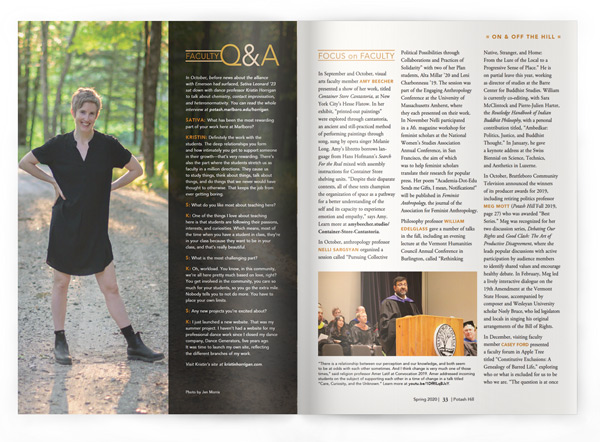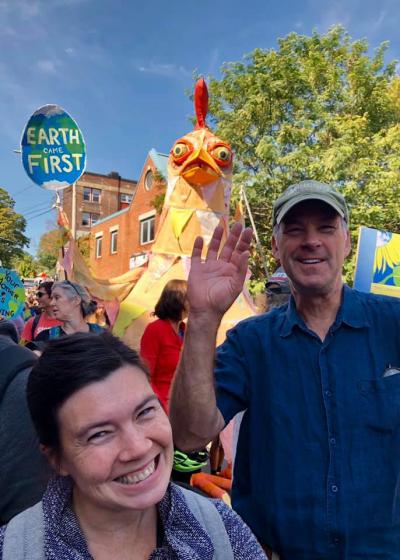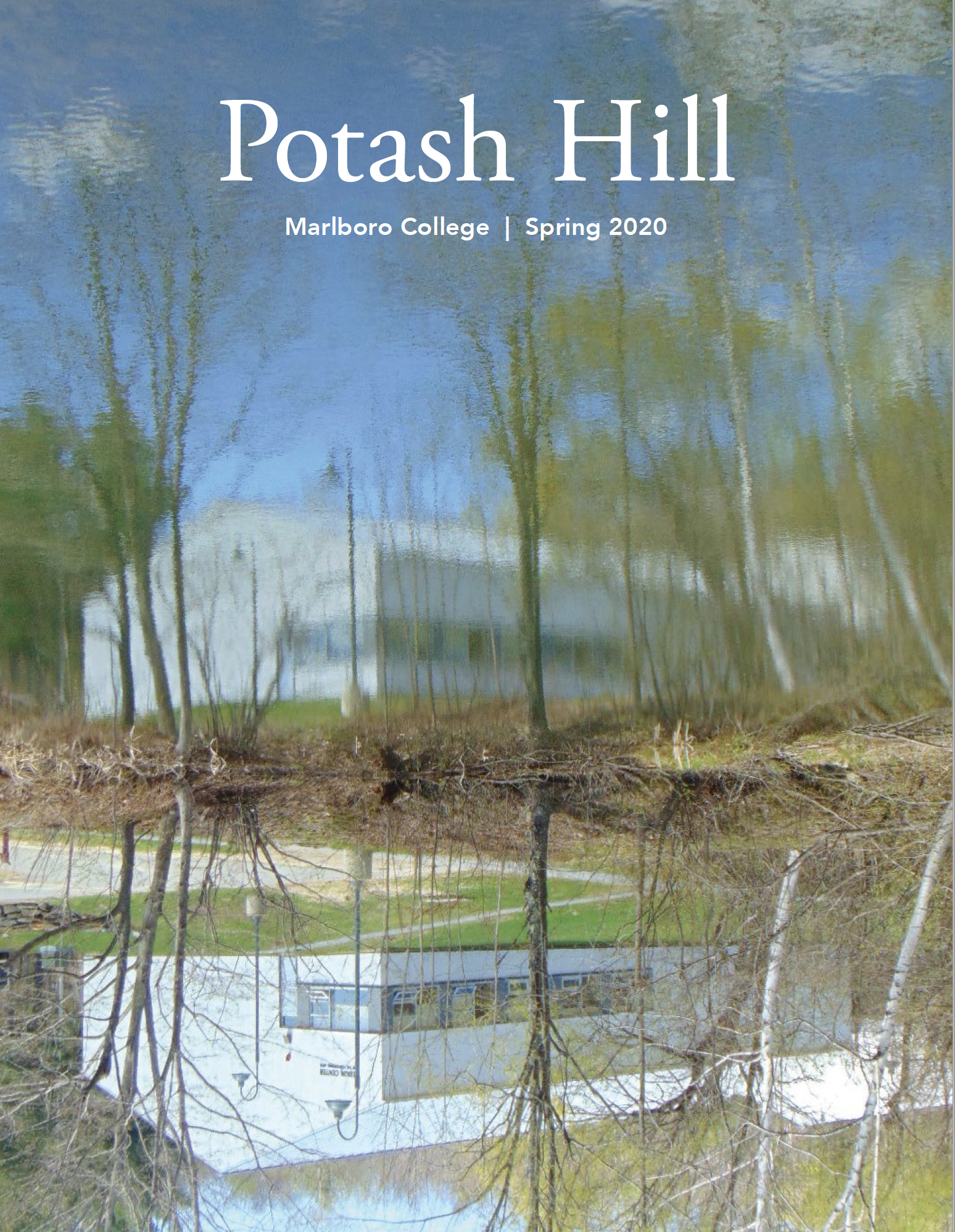
FacultyQ&A
In October, before news about the alliance with Emerson had surfaced, Sativa Leonard ’23 sat down with dance professor Kristin Horrigan to talk about chemistry, contact improvisation, and heteronormativity. You can read the whole interview at potash.marlboro.edu/horrigan.
Sativa: What has been the most rewarding part of your work here at Marlboro?
Kristin: Definitely the work with the students. The deep relationships you form and how intimately you get to support someone in their growth—that’s very rewarding. There’s also the part where the students stretch us as faculty in a million directions. They cause us to study things, think about things, talk about things, and do things that we never would have thought to otherwise. That keeps the job from ever getting boring.
S: What do you like most about teaching here?
K: One of the things I love about teaching here is that students are following their passions, interests, and curiosities. Which means, most of the time when you have a student in class, they’re in your class because they want to be in your class, and that’s really beautiful.
S: What is the most challenging part?
K: Oh, workload. You know, in this community, we’re all here pretty much based on love, right? You get involved in the community, you care so much for your students, so you go the extra mile. Nobody tells you to not do more. You have to place your own limits.
S: Any new projects you’re excited about?
K: I just launched a new website. That was my summer project. I haven’t had a website for my professional dance work since I closed my dance company, Dance Generators, five years ago. It was time to launch my own site, reflecting the different branches of my work.
Visit Kristin’s site at kristinhorrigan.com. Photo by Jen Morris
In September and October, visual arts faculty member Amy Beecher presented a show of her work, titled Container Store Cantastoria, at New York City’s Hesse Flatow. In her exhibit, “printed-out paintings” were explored through cantastoria, an ancient and still-practiced method of performing paintings through song, sung by opera singer Melanie Long. Amy’s libretto borrows language from Hans Hofmann’s Search For the Real mixed with assembly instructions for Container Store shelving units. “Despite their disparate contexts, all of these texts champion the organization of space as a pathway for a better understanding of the self and its capacity to experience emotion and empathy,” says Amy. Learn more at amybeecher.studio/Container-Store-Cantastoria.
In October, anthropology professor Nelli Sargsyan organized a session called “Pursuing Collective Political Possibilities through Collaborations and Practices of Solidarity” with two of her Plan students, Alta Millar ’20 and Leni Charbonneau ’19. The session was part of the Engaging Anthropology Conference at the University of Massachusetts Amherst, where they each presented on their work. In November Nelli participated in a Ms. magazine workshop for feminist scholars at the National Women’s Studies Association Annual Conference, in San Francisco, the aim of which was to help feminist scholars translate their research for popular press. Her poem “Academia-Dot-Edu Sends me Gifts, I mean, Notifications!” will be published in Feminist Anthropology, the journal of the Association for Feminist Anthropology.
Philosophy professor William Edelglass gave a number of talks in the fall, including an evening lecture at the Vermont Humanities Council Annual Conference in Burlington, called “Rethinking Native, Stranger, and Home: From the Lure of the Local to a Progressive Sense of Place.” He is on partial leave this year, working as director of studies at the Barre Center for Buddhist Studies. William is currently co-editing, with Sara McClintock and Pierre-Julien Harter, the Routledge Handbook of Indian Buddhist Philosophy, with a personal contribution titled, “Ambedkar: Politics, Justice, and Buddhist Thought.” In January, he gave a keynote address at the Swiss Biennial on Science, Technics, and Aesthetics in Luzerne.
In October, Brattleboro Community Television announced the winners of its producer awards for 2019, including retiring politics professor Meg Mott (Potash Hill Fall 2019) who was awarded “Best Series.” Meg was recognized for her two discussion series, Debating Our Rights and Good Clash: The Art of Productive Disagreement, where she leads popular discussions with active participation by audience members to identify shared values and encourage healthy debate. In February, Meg led a lively interactive dialogue on the 19th Amendment at the Vermont State House, accompanied by composer and Wesleyan University scholar Neely Bruce, who led legislators and locals in singing his original arrangements of the Bill of Rights.
In December, visiting faculty member Casey Ford presented a faculty forum in Apple Tree titled “Constitutive Exclusions: A Genealogy of Barred Life,” exploring who or what is excluded for us to be who we are. “The question is at once biological, affective, cultural, and political,” says Casey. “Running through each domain is a philosophical concern: to be something involves an essential relation to otherness which is not simply co-present but exclusionary.” Casey’s research project examines the specific role that “exclusion” has played in the way we have, in the West, conceived of the founding and sustaining of political community.
Spanish language and literature professor Rosario de Swanson was invited to participate in the Brattleboro Literary Festival in October, where she appeared on a panel discussion about literature and race with award-winning writers Michael Datcher and Jess Row, moderated by philosophy professor William Edelglass. She also served as a visiting professor at Bennington College for the fall, teaching a course titled Literature as Resistance: The Works of Rosario Castellanos. Given her record of publications on Latin American literature, Rosario was invited to do book reviews for Hispania, the official journal of the American Association of Teachers of Spanish and Portuguese, the first of which was due to come out in December.
 In January, literature and writing professor Rituparna Mitra presented papers in two panels, titled “The Other South Asia” and “Representational Challenges in Postcolonial Urban Studies,” at the Modern Language Association’s annual meeting in Seattle. In March, she presented a paper and co-organized a panel titled “Fictions of the Neoliberal City” at the American Comparative Literature Association’s Annual Meeting in Chicago, and also presented on the panel “Environmental Trauma and Postcolonial Writing” at the Northeast Modern Language Association’s Annual Convention in Boston. Rituparna’s essay “Precarious Duniyas: Post-Human Subjectivity and Alterglobal Politics in The Ministry of Utmost Happiness” will be published in a Postcolonial Studies special issue on “Alterglobal Politics: Postcolonial Theory in the Era of the Anthropocene and the Nonhuman.”
In January, literature and writing professor Rituparna Mitra presented papers in two panels, titled “The Other South Asia” and “Representational Challenges in Postcolonial Urban Studies,” at the Modern Language Association’s annual meeting in Seattle. In March, she presented a paper and co-organized a panel titled “Fictions of the Neoliberal City” at the American Comparative Literature Association’s Annual Meeting in Chicago, and also presented on the panel “Environmental Trauma and Postcolonial Writing” at the Northeast Modern Language Association’s Annual Convention in Boston. Rituparna’s essay “Precarious Duniyas: Post-Human Subjectivity and Alterglobal Politics in The Ministry of Utmost Happiness” will be published in a Postcolonial Studies special issue on “Alterglobal Politics: Postcolonial Theory in the Era of the Anthropocene and the Nonhuman.”
In addition to his new book, Mni Wiconi, photography professor John Willis also published an updated and expanded edition of his 2010 book Views from the Reservation (George F. Thompson Publishing) in September, based on his more than 25 years of visiting Pine Ridge Reservation. Along with his insightful and accomplished images, John has enlisted other voices to offer a more complete story, from powerful poems by Lakota elders and high school students to a story of growing up on the reservation by Emil Her Many Horses, a curator at the National Museum of the American Indian.
Theater professor Brenda Foley collaborated this past year on The Audacity: Women Speak, a play produced by Sleeping Weazel theater company. The play, which highlights real stories of women’s experiences with gender-biased treatment and sexual harassment, systemic misogyny and sexism, and assault and rape, was named by the Boston Globe as one of the ten best of 2019. Also, Routledge Publishing has selected Brenda’s book A Legacy of Violence: Women, Mental Illness, and Performance to be one of their open access texts.
Keep an eye peeled for Sisters Rising (nee Arming Sisters, Potash Hill Spring 2015), the film by visiting professor of film and video studies Brad Heck ’04 and partner Willow O’Feral ’07, making this year’s festival circuit. The film, which documents a grassroots movement to end sexual violence against indigenous women and shares the stories of survivors fighting for positive change, was invited to premiere at Big Sky Film Festival in Missoula, Montana, in February. It was also slated for a California premiere at California’s American Indian & Indigenous Film Festival, and there will be more coming. Learn more at SistersRisingMovie.com.
![]()

